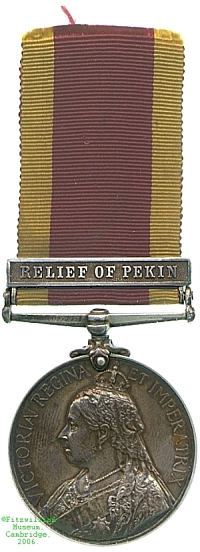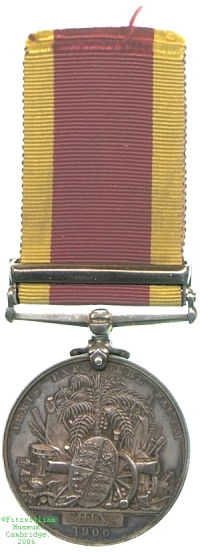
Obverse, a bust of Queen Victoria

Reverse, a collection of war trophies including a royal shield below palm tree

Obverse, a bust of Queen Victoria |

Reverse, a collection of war trophies including a royal shield below palm tree |
The extent to which foreign powers appeared to be able to intervene in nineteenth-century China without effective opposition from the Imperial dynasty led to considerable resentment among the population. In 1897 Germany, Russia, Britain and France seized four Chinese ports on various pretexts and this, with more local situations providing flashpoints, sparked off a military uprising by a resistance group called the Society of Righteous and Harmonious Fists, known in the West as Boxers. Starting in 1898 foreigners and Christian Chinese were subjected to increasingly brutal persecution by the Boxers, whom the Imperial Government, in the hands of the Dowager Empress Cixi, were now supporting as useful tools to remove foreign powers from China. It took the Western powers some time to assemble a coalition force strong enough (mostly Japanese, but with contingents from Russia, Britain, France, the USA, Germany, Italy and Austro-Hungary as well as some Chinese) to relieve the foreign population of Beijing and finally suppress the rebellion.
The recipient of this medal was Private S. Smith of the 2nd Battalion of the Royal Welsh Fusiliers (or 23rd Foot), and the bar represents his participation in the march from Tianjin to Beijing and the latter city's occupation (and pillage) by the coalition forces, events which effectively ended the war. The medal was purchased by Lester Watson at some point before 1928.